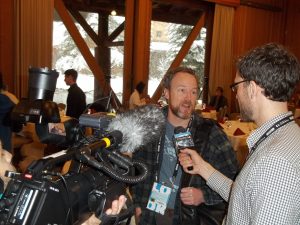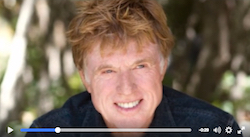Mr. Redford, you have been an inspiration in my work. I join legions of independent filmmakers who thank you for your example, your guidance, and your encouragement. I wish you a very happy and healthy 80th birthday.
I was delighted to meet Robert Redford — who goes by “Bob” — in the recording studio back in 2011. His voice joined that of Warren Miller in narrating our film The Movement: One Man Joins an Uprising. Our movie told the story of people with disabilities finding freedom in the mountains. The finished film swept millions of viewers along on our characters’ journeys over their respective obstacles. But early in the film’s release I was feeling my own invisible obstacles as an artist and filmmaker. I didn’t feel comfortable arriving at Bob’s 2012 Sundance Festival brunch for the directors of that year’s films. I looked at a huge room full of people I presumed had gone to film school, or who must have had a better sense of what they were doing as filmmakers. I asked myself, “what the hell am I doing here?!”

Something in Bob’s speech that morning assured me that, for all the congratulations we deserved, our job was only just beginning. Being a Sundance alum, I took him to say, was more about the path ahead than the work that got us here. Somehow that kick in the ass was more comforting than a pat on the back (I’ve always thought that I chose my career because it was something I would never be good enough at … and thus it would sustain and challenge me throughout my whole life). I left brunch feeling a sense of community with other storytellers who were doing it their own way: mavericks, champions of underrepresented voices, true creators.
“Something comes together that almost—for me it reaches a spiritual moment.” – Robert Redford on skiing
I think Bob’s challenge at that director’s brunch has mightily motivated me. I’ve made a new movie, Power of the River, that feels like a fitting successor to The Movement. It’s my feature debut, my first official foray into producing, and quite the leap of faith. About this new film, Bob was kind enough to say: “A cinematic adventure into the heart of wilderness, Power of the River captures the connection between people and the rivers that are our lifeblood.” It would seem his influence and encouragement are still key factors spurring my work onward.
To celebrate the occasion of Bob’s 80th birthday, here are more links and reminiscences, including Bob’s own words about “foolish courage” …
- Read today’s Sundance Institute post for more of Bob’s words of wisdom for adventurous artists and storytellers.
- Read my articles in the Huffington Post about that adventurous journey toward the Sundance director’s brunch back in 2012 including jumping naked into a frozen lake and hurtling half-blind down an icy highway.
 Hear Bob explain, in his own voice, why he was excited to be part of The Movement: http://bit.ly/bob-mtns
Hear Bob explain, in his own voice, why he was excited to be part of The Movement: http://bit.ly/bob-mtns- Back in that recording studio in 2011 we went off-script for our narration and let Bob wax poetic about his connection to mountains. Here is the transcript:
Robert Redford on Skiing
Recorded July, 2011 for narration of The Movement
The first time I skied was a disaster. I was 11 years old and growing up in Los Angeles and somebody said, “come on, let’s go up to Big Bear and ski.” So I went there not having a clue. In those days it was long wooden boards and different kinds of boots. Their idea of showing me how to do it, to help me along, was just say: “Look, go up on the lift and when you get off snowplow.”
So you can imagine what my day was like; it was a disaster. I only had one moment where it was thrilling and that’s when I couldn’t turn and there was open space, and I just let the skis run and that was pretty exciting. I think that stuck with me, so that years later when I was living in Utah in the mountains, I realized I have to be completely a part of this environment—which means wintertime.
I took up skiing late in my life: my late 20s. Just like skateboarding or snowboarding or anything like that, it’s always frustrating at first because you’re clumsy and you make a lot of mistakes and you feel like hell. But once you cross that first threshold, then the reason for it all starts to come clear. I’ve loved speed all my life and always will. The thrill of moving quickly through the natural environment and feeling all that wonderful wind in your face, and making turns with your body that become more graceful, something comes together that almost—for me it reaches a spiritual moment.
Doing Downhill Racer, the reason I wanted to make that film was because I have been at sports my whole life. Skiing was the one sport I had not done as a kid; and if I was going to do a sport, I wanted it to be different from sports like baseball, football, or track maybe. For me, it was a combination of poetry and danger. I chose downhill skiing because of the danger, and there’s also a beauty in it. It takes a certain kind of foolish courage.
O, to foolish courage. May it always rise up to meet you on the path ahead, Mr. Redford. Cheers,
![]()